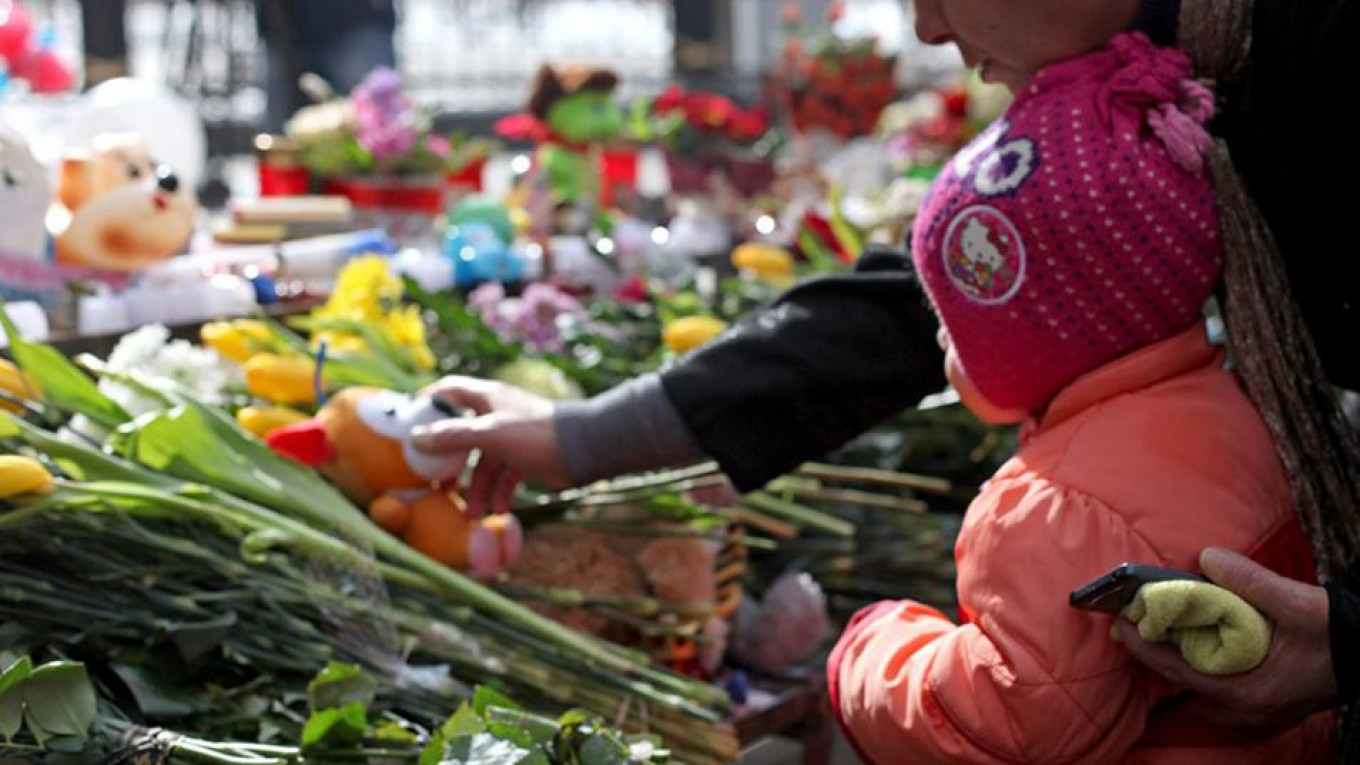The tragedy in Kemerovo in which at least 64 people died — most of them children — is essentially a second Beslan.
Although many fewer people died in Kemerovo than in the 2003 hostage crisis, this tragedy was caused not by terrorism, but by gross negligence on the part of Winter Cherry mall employees and administrators, with possible complicity on the part of the safety inspectors.
Once again, the very state bodies tasked with protecting the public from life-threatening negligence on the part of businesses and individuals have failed in their primary duty. Society pays for this in the currency of human lives and yet is unable to exercise any control over those entrusted with ensuring their safety.
According to available information, the fire at the Winter Cherry mall in Kemerovo claimed the greatest number of lives of any fire apart from the tragedy at the Lame Horse nightclub in Perm in December 2009, in which 156 people were killed.
There, too, patrons were unable to escape because emergency exits were blocked. They inhaled noxious fumes as building materials burned that had been banned for use. Major breaches in safety procedures also cost the lives of 238 miners in Kemerovo between 2007 and 2010.
The investigation has only begun into the Winter Cherry fire, but the available evidence suggests that a number of people are to blame for the deaths.
The fire alarm and fire-suppression systems reportedly failed, and the alert system was disabled. Judging by surveillance camera footage, the initial burst of flames, fire and thick smoke spread through the building within seconds, and no one is seen organizing an evacuation.
Firemen found bodies near the doors of the blocked emergency exits. Rescue workers never did reach the movie theater’s doors, which employees had previously fastened shut, trapping the children inside, because that entire part of the structure collapsed in the fire before rescuers arrived.
First and last names stand behind each of these individual acts of negligence that together caused this tragedy. There is a person responsible for the non-functioning alarm. Another person is responsible for blocking the emergency exits. A third is responsible for illegally using interior decor materials that did not resist flames and emitted toxic fumes.
A fourth failed in their duty to evacuate people during the emergency. There are individuals who approved the building for operation and conducted fire safety checks.
Investigators have already detained and questioned four suspects: the company’s technical director and co-owner of the mall, the tenant of the premises where the fire allegedly started and the employee and head of the organization that serviced the fire alarm. The Investigative Committee has identified a fifth suspect — the guard who turned off the warning system after the fire had started.
The Prosecutor General’s Office simultaneously announced widespread inspections of malls and entertainment centers across the country. Violations will undoubtedly be uncovered in malls in other cities, and the authorities will probably more strictly enforce fire codes for a time. This is their typical reaction to disasters – a public effort to act responsibly followed by a nearly complete relaxation of the rules.
All of these measures, however, provide no guarantee that a similar fire will not break out.
Despite all the inspections and investigations, tragedies caused by human negligence or error have been occurring with increasing frequency, giving Russians a terrifying sense of deja vu.
Nineteen people died on March 11, 2015 when the Admiral mall in Kazan burned, most succumbing to poisonous gases released by polyurethane panels. After that fire, the authorities conducted numerous inspections of malls across the country and uncovered countless violations almost identical to those that caused the tragedy in Kemerovo: too few fire alarms, automatic fire-suppression systems, smoke removal ventilation systems, and emergency evacuation plans, not to mention blocked escape routes.
For some reason, though, the authorities apparently did not conduct a snap inspection of the Winter Cherry mall. According to information provided by the Professional Market and Company Analysis System (SPARK), the mall’s only fire safety inspection took place in 2016. What’s more, it lasted only two days instead of the required 20. The inspection found no code violations.
Тhe fire inspections which are normally scheduled to take place on a regular basis, were limited by something called "supervisory holidays" that apply to small businesses. The property management company of the Winter Cherry mall is formally classified as a small business.
When systems of inspections are ineffective, corrupt, or reduced to mere formalities, negligence by any low-level employee can place members of the public at risk.
Yes, these systems should improve and reforms have been underway for many years, but they will never be effective until every inspector and everyone under inspection realizes that their personal negligence, cowardice or greed can cost the lives of innocent people.
This article by Pavel Aptekar, Ivan Prosvetov, and Maria Zheleznova was originally published in the Vedomosti business daily. The views and opinions expressed in opinion pieces do not necessarily reflect the position of The Moscow Times

A Message from The Moscow Times:
Dear readers,
We are facing unprecedented challenges. Russia's Prosecutor General's Office has designated The Moscow Times as an "undesirable" organization, criminalizing our work and putting our staff at risk of prosecution. This follows our earlier unjust labeling as a "foreign agent."
These actions are direct attempts to silence independent journalism in Russia. The authorities claim our work "discredits the decisions of the Russian leadership." We see things differently: we strive to provide accurate, unbiased reporting on Russia.
We, the journalists of The Moscow Times, refuse to be silenced. But to continue our work, we need your help.
Your support, no matter how small, makes a world of difference. If you can, please support us monthly starting from just $2. It's quick to set up, and every contribution makes a significant impact.
By supporting The Moscow Times, you're defending open, independent journalism in the face of repression. Thank you for standing with us.
Remind me later.






